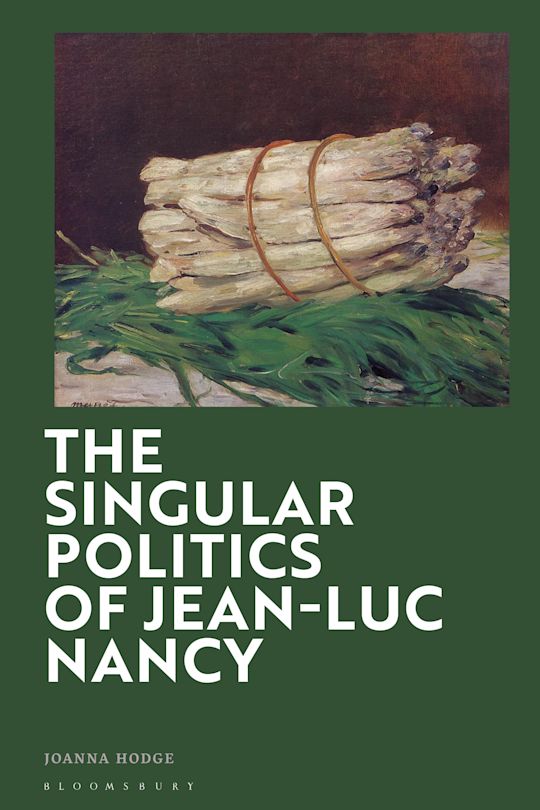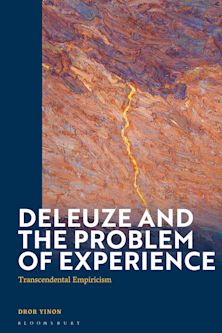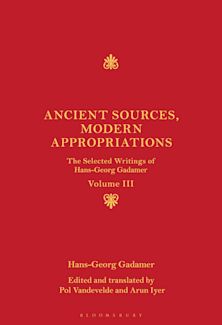- Home
- ACADEMIC
- Philosophy
- Twentieth-Century Philosophy
- The Singular Politics of Jean-Luc Nancy
The Singular Politics of Jean-Luc Nancy
Payment for this pre-order will be taken when the item becomes available
- Delivery and returns info
-
Free US delivery on orders $35 or over
You must sign in to add this item to your wishlist. Please sign in or create an account
Description
In this wide-ranging and philosophically rigorous examination of Jean-Luc Nancy's reinvention of ontology as a theory of political contestation, Joanna Hodge proposes a model of Nancy's philosophy as collective practice: thinking with others, navigating translation, responding to crisis.
The Singular Politics of Jean-Luc Nancy identifies the French philosopher as linking a theory of innovation and meaning to a theory of a contestation of worlds, within which the structures basic to politics and political analysis themselves mutate. The book focuses on the inventions in Nancy's writing itself, alongside the more familiar themes, retreating the political, being singular plural, and a deconstructing of Christianity, the strategies of interruption and fragmentation. His distinctive notions of comparution, and partage, of ecotechnics and excription, of sexistence and concealed thinking are introduced, his reception and re-formulations of key Christian phrases are made pivotal: ecce homo, noli me tangere, vox clamans in deserto; behold the man, do not touch me, a voice crying in the wilderness.
Connections between western political theorising, a fraught religious inheritance and a relative autonomy of art practice form a context for assessing what comes after a disruption of sovereignty and subjectivity, as governing terms delineating a domain of political thinking. Joanna Hodge shows how Nancy rethinks time and history, examining his disruptive relation to a time of inheritance, a time of current contestation and a time of anticipated futures, through his focus on time as insurrection and birth to presence.
Table of Contents
List of Abbreviations
Part One Birth to Presence: ecce homo
Chapter One: Opening
1: On the Threshold
2: Disputed Legacies
3: Invoking Areality
4: (In)completions and Ends
Chapter Two: Strange Conjugations
5: Citations and Epigraphs
6: Divisive Inheritances
7: From Political Economy to Ecotechnics
Part Two Thinking in Parentheses: noli me tangere
Chapter Three: Starting Again
8: Do Not Touch Me
9: Further Interruptions
10: Binding the Corpus
11: Thinking, Drawing, Offering
Chapter Four: Arts of Interruption
12: Politics of Friendship
13: Psyche is Outstretched
14: Interrupted Thinking
15: Thinking Beyond Thinking
Part Three A Politics of Mutation and Insurrection: vox clamans in deserto
Chapter Five: A Changing World
16: Politics and Beyond
17: New Worlds in Formation
18: On this Strange Threshold
19: Singularities of Skin, Voice, Excription
Chapter Six: After Disaster
20: Towards A Singular Politics
21: Doubling Back
22: Phenomenology Unbound
23: Rewriting Heidegger's Topologies
24: Secular Apocalypse
Bibliography
Product details

| Published | Apr 16 2026 |
|---|---|
| Format | Hardback |
| Edition | 1st |
| Extent | 320 |
| ISBN | 9781474252799 |
| Imprint | Bloomsbury Academic |
| Dimensions | 9 x 6 inches |
| Publisher | Bloomsbury Publishing |
About the contributors
Reviews
-
This work represents the most capacious and compelling account to date of why and how Jean-Luc Nancy should be read as the foremost philosopher of our times. Hodge evinces a virtuoso command of the ins-and-outs of Nancy's challenging and complex set of writings, painstakingly working through the myriad changes and disparities between the various editions, translations and collections of his work to reveal the signal contributions, effective interruptions and radical revisions Nancy makes to the philosophical tradition. Correlatively, Hodge with a consummate mastery of that tradition, carefully and precisely unpacks the specific ways Nancy both borrows and departs from the work of Kant, Hegel, Husserl, and especially Heidegger. Staging these developments by way of a set of strategic dialogues between Nancy and various contemporaries (Derrida, Lévinas, Bataille, and Blanchot), Hodge magisterially foregrounds the urgency of such Nancean notions as excription, mitsein, comparution, partage, finitude, singularities, ecotechnics, and the “to come” of secular apocalypse for rethinking the very concepts of democracy, sovereignty, and sense itself whose very being are at stake in the current “fourfold” conjuncture of extermination, expropriation, simulation, and technicization. An impressively thought-provoking book!
Georges Van Den Abbeele, Professor of Humanities, University of California, USA
-
The Singular Politics of Jean-Luc Nancy intertwines Nancy's ontology and his political philosophy. Bringing these two sides of Nancy's thought together, Hodge investigates almost every text Nancy has ever published. The Singular Politics of Jean-Luc Nancy is the most comprehensive study of Nancy's thought to date.
Leonard Lawlor, Edwin Earle Sparks Professor of Philosophy, Penn State University, USA


































